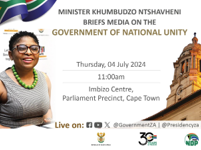
Minister in the Presidency Khumbudzo Ntshavheni has moved to clarify that any policy or significant decision will be taken through Cabinet first before a decision on implementation can be taken.
The Minister was speaking at a media briefing a day after the swearing in ceremony of the Deputy President, Ministers and Deputy Ministers of the seventh administration on Wednesday.
The ceremony heralded in the Government of National Unity formed by members of eleven different political parties.
The eleven parties to the GNU include the African National Congress, Democratic Alliance, Patriotic Alliance, Inkatha Freedom Party, Good Party, Pan Africanist Congress of Azania, Freedom Front Plus, United Democratic Movement, Al Jama-ah, Rise Mzansi and the United Africans Transformation.
During the briefing, Ntshavheni was at pains to explain that policy is not decided upon by individual ministers but through Cabinet.
“It should be stressed that both the President and individual ministers are duty bound to take the issues of policy, significant decisions such as decisions with financial consequences exceeding a department’s approved budget and any other matter…. they must take those matters to Cabinet.
“Failure to do so could undermine the validity of such a decision. So there is no single minister who can expropriate a decision of Cabinet or that policy decision to themselves because then that policy will not be valid in terms of the laws of the Republic…as provided for in the Constitution,” she said at Thursday’s briefing in Cape Town.
WATCH | Media briefing on the Government of National Unity
Doubling down on her emphasis, the minister said as head of the National Executive, President Ramaphosa “exercises the executive authority of the Republic together with other members of the Cabinet and members of the Cabinet are only ministers”.
“In this regard, the President, with the Cabinet he is responsible for, and I’m quoting directly from the Constitution, implementing national legislation unless the Constitution or an Act of Parliament provides others.
“Two, developing and implementing national policy. So, the national policies are not of individual ministers but of Cabinet.”
Ntshavheni noted that although the Constitution provides that Cabinet take collective responsibility, it gives leeway for determination on which matters can be left to individual ministers.
“[It] allows the Cabinet and the President to determine the way and procedures by which they work together, including leaving certain matters or kinds of matters to be dealt with by a single member of Cabinet, meaning a minister.
“Therefore, if a matter is not a routine matter or departmental specific matter or function, it must first be referred to Cabinet as must all matters that Cabinet itself has decided should come to it. In general, if a matter is not a routine matter it must be referred to Cabinet for its consideration by way of a Cabinet Memorandum,” she explained.
The Minister said the President can also determine when a decision that has been referred to him should be discussed in Cabinet first.
“This envisages that the President himself may determine that a President’s Minute referred to him for signature…should in fact go to the Cabinet first and, accordingly, refer it back to the Minister to take to the Cabinet.
“This is an approach which is accepted by the Cabinet as its way of “acting together with the President” when he exercises executive authority under the Constitution,” Ntshavheni said. – SAnews.gov.za


